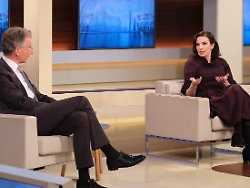Anne Will on sanctions
“Next winter there will be no more Ukraine”
By Marko Schlichting
3/21/2022 3:44 am
Three and a half weeks after the Russian army invaded Ukraine, there is no end in sight to the war. The sanctions imposed are working – but not quickly. Is Germany already at the end of its possibilities?
The war in Ukraine has been raging for three and a half weeks now. Although there is no end in sight, the people of Russia are now feeling the effects of the sanctions against their country. In military terms, the first experts see the possibility that Russia cannot win the war of aggression against Ukraine. The guests at Anne Will are looking for ways out of the crisis. The discussion: very factual – until shortly before the end, the publicist Marina Weisband causes dismay with a statement in which she herself has tears in her eyes.
“In retrospect, a wrong decision”
First of all, however, it is about the much-discussed Bundestag session on Thursday, at which Ukrainian President Volodymyr Zelenskyj gave a speech. After that, it was back to business as usual. A mistake, the traffic light coalition saw later. The Federal Minister of Defense Christine Lamprecht explained to Anne Will that the speeches were to be left to their own devices. “In retrospect, it was a wrong decision,” she says. Zelenskyj’s speech touched. After that it should have been discussed. FDP foreign politician Alexander Graf Lambsdorff also reacted self-critically. Apparently the managing directors of the factions are still too much in routine mode, he admits. Now it’s important to look ahead, says the head of the Munich Security Conference, Christoph Heusgen, setting the tenor of the further discussion. Now it’s important to help Ukraine, and that’s what Germany is doing, he says.
Political advisor Stefanie Babst also agrees. Germany, the EU and NATO have been supporting Ukraine financially and militarily since 2014, says the former NATO strategist. The current conflict will continue for a long time and will continue to escalate in the coming weeks and months. Putin can no longer row back. “He will try to militarily hold the areas he has already conquered, but he will also attack other targets. In the end, he will try to create a buffer zone and push Ukraine back to a kind of rump state in the west,” she said.
The Kyiv-born journalist and Green politician Marina Weisband describes her dilemma: Her family, who lives in Ukraine, would like a no-fly zone. “I can’t support that,” she says. “But we have to do everything we can to not help finance this war,” says Weisband. “Because if we lose in Ukraine, then we no longer have a guarantee of peace, because then nothing matters anymore except who has the stronger military and the most nuclear weapons. We’re on the losing side there.”
Weisband supports temporary embargo
“We could do a lot with a short-term energy embargo,” says Weisband during the program. In doing so, she is repeating a suggestion made by the Ukrainian Ambassador Andriy Melnyk. On Thursday in the ZDF program Maybrit Illner, he brought up a two-month economic embargo against Russia in order to quickly end the Ukraine war.
Political scientist Babst sees the point of the embargo not only in ending the Russian war of aggression. “The Russian economy is suffering very badly from the sanctions,” she says. “We have hope that there will be a regime change in Russia and that Putin will be swept from the surface. We really can’t imagine working with a Russia ruled by a Putin anymore. And the fate of Ukraine is up to Putin linked to political survival.” Christoph Heusgen, the chairman of the Munich Security Conference, would later add that he wanted the Russian president to stand trial before a war crimes tribunal after the war.
Defense Minister Lamprecht has meanwhile made it clear that sanctions against Russia cannot be tightened immediately. They don’t make sense if they can’t be sustained. Federal Minister of Economics Robert Habeck had just been to Qatar and had taken steps there.
Heusgen proposes trust funds
Christoph Heusgen also believes that Germany cannot free itself from its dependence on Russia and its fossil fuels overnight. But Russia takes almost 200 million euros every day from raw material deliveries to Germany alone. “Why don’t we put part of this money in a trust fund that will then be used to finance the reconstruction of Ukraine?” asks Heusgen.
“Frustrating Discussions”
At the end of the day, Marina Weisband is the only one in the panel who advocates much tougher and faster action against Putin. “We’re talking about the tightened sanctions beginning next winter. But if things continue like this, there won’t be any Ukraine next winter,” she says.
At the end of the show, she can no longer contain her desperation. “I find this discussion very frustrating,” she says. NATO is acting as if it doesn’t care what’s happening outside its door. “Putin can use chemical weapons and tactical nuclear weapons, he can level cities. He already knows that it won’t cost him anything. If this is to be the security order in our world, we need a new security order, because otherwise the The law of the strongest applies in the world. We support Ukraine as long as it doesn’t endanger us militarily or economically and as long as we don’t have any unemployed. But the people in Ukraine are just as real as the people here. Except: the people in Ukraine are dying right now! We need a new security order for the whole world. This is very frustrating.”
Then her voice breaks. And she has tears in her eyes.
